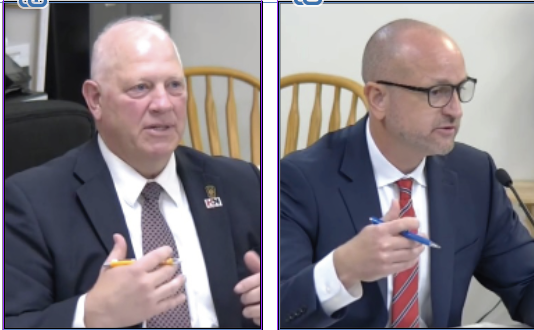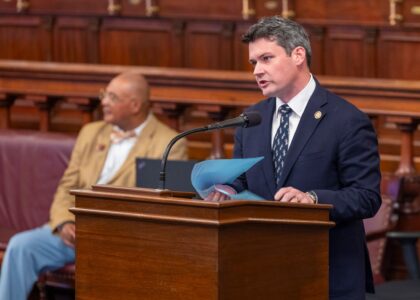Game Commission hears local land acquisition complaints, but remedies uncertain

Pictured are Don Sneath (left), state director of public policy and legislative affairs for Hunter Nation, and Stephen Smith (right) state Game Commission executive director. Both are shown testifying during a recent state Senate Game and Fisheries Committee public hearing on the state Game Commission’s land acquisition policy.
Changes to state law are likely necessary to protect rural counties from continued expansion of state game lands.
During a recent state Senate Game and Fisheries Committee public hearing on the state Game Commission’s land acquisition policy, it was made clear from rural county and landowners’ officials that many rural counties can’t afford the loss of tax revenue that comes with expansion of state game lands, even if those expansions create additional tourism opportunities and ancillary economic benefits from oil and gas leases and timber foresting. Dan Sneath, state director of public policy and legislative affairs for Hunter Nation, testified that his organization is in favor of Rep. Mandy Steele’s bill to increase the $400 per acre limit that the Game Commission can pay when acquiring land. Steele’s bill was one of the reasons county commissioner Ken Klakamp wanted to testify in the Senate hearing.
While some in Warren County oppose the bill because they fear it could lead to more land acquisitions in rural areas like Warren County, Sneath testified that lifting the cap should allow the Game Commission to purchase land in urban areas downstate, which would lessen the Game Commission’s purchase of new land in rural counties.
He also noted a bill that has been introduced in the state House of Representatives that could keep the $400 cap for rural counties while allowing the Game Commission to pay fair market value in more populous counties.
“Again there is no other alternative one on the table right now,” Sneath said. “That is actually a bill that seems to actually address the concerns of not purchasing as much land in the northern tier or in the more rural counties while allowing the game commission to have more flexibility in the areas where the population is greater so that they could purchase lands at a land value that is what land is sold for those areas.”
Sen. Lindsey Williams, D-Pittsburgh, spoke in favor of supporting the payment of fair market value for land, noting fair market value in rural areas could also help rural counties not be shortchanged when game lands are expanded. Stephen Smith, state Game Commission executive director, said the commission in general supports flexibility while acknowledging the concerns raised by Klakamp and officials from rural counties.
“We absolutely support, as you would expect, having flexibility to see that cap raised so that we can pay fair market value in other counties, in counties south of Route 80,” Smith said. “I think senators Dush and Hutchinson, your point has been heard loud and clear about the need to look elsewhere. It’s probably long overdue to look at that number and come up with a more reasonable modern-day number that would allow us to protect land exactly like the one you describe there in Allegheny County. I think that model could work for other counties and we would be happy to work with you in the community to address this issue.”
How far the Game Commission is willing to go to accommodate rural counties is an unanswered question, however. While Smith said paying fair market value could help focus the state Game Commission on areas outside of the northern tier, there was pushback from Smith and Dan Gustafson when asked about divesting land or helping make other investments in rural counties that are home to state game lands. Smith said money generated from hunting and fishing licenses is limited by state law to be used in furtherance of wildlife and conservation efforts.
Sen. Greg Rothman, R-New Bloomfield, asked about the concept of selling state game lands in rural areas where development could occur, with the commission using the proceeds of those sales to purchase new game land in more urban areas. Smith said that would require a change in state law.
“We don’t have the authority to sell land,” Smith said. “There is a provision in law regarding selling land. We have the ability to exchange land, but not to do an outright sale, so that limitation is how Title 34 is currently written, which obviously then prohibits us, doesn’t give us the authority to talk about selling parcels to anyone else.”
Hutchinson, who earlier in the session had asked about a no-net loss system in which the Game Commission would have to sell land in order to purchase new land, also asked about the payment of realty transfer fees on Game Commission land acquisitions.
“Do you think it’s fair when you have these transactions, some of which are pretty big, that you have ways to get around paying realty transfer taxes?” Hutchinson asked. “When you make those transactions, do you think it’s fair to the citizens who might be buying property – I don’t think it’s fair, obviously. What would you think if we put in a bill that says every transaction, you’re paying transfer tax. Again, that’s only a one-time deal whereas most property, over time, is going to have many transactions going forward.”
Smith responded by saying such a proposal would likely violate other state laws that require Game Commission revenue to be spent to administer the agency. Spending revenue on taxes could violate federal law and make the Game Commission ineligible for between $25 and $30 million a year in federal funding.
When Hutchinson pressed on the issue by saying the commission pays some transfer taxes, Smith and Dave Gustafson, state Game Commission deputy executive director, said the property seller usually pays the transfer taxes since the Game Commission, by law, cannot.
“Well then, there should be no question that you would support the seller paying it,” Hutchinson responded.
“I think we would refer to the law in the Department of Revenue’s opinion of those issues,” Gustafson responded.
While the issue of state game land expansion is a statewide issue, the 2023 transfer was a primary point of discussion during the recent hearing .The transfer was part of a 2,195 acre land-for-oil deal between the Pennsylvania Game Commission and Pennsylvania General Energy. The property includes the historic Clough farm. The value of the property was estimated at $6 million in 2023.
Terms of the transfer saw the Spring Creek Tract, referred to as the “Glen Dorn Property” by a PGC Facebook post, transferred to the PGC along with 943 acres in Cambria County in exchange for PGE’s ability to extract oil and gas from beneath a state game land in Lycoming County. The Game Commission said in a statement that the Spring Creek Tract was considered one of the most prized in the area because of its biological diversity. It is now State Game Lands 337 – though not without controversy.
Warren County is home to 36,922.03 acres of state game lands that will be valued in 2026 under the county’s reassessment at $10,920,950, according to testimony provided by Klakamp during the hearing. Roughly one-third of Warren County’s land is owned by either the Allegheny National Forest, Pennsylvania Game Commission or the Pennsylvania State Forest.
Hutchinson noted that one reason Smith chose to live in Cumberland County was because of state game lands in the county – but it wasn’t the only reason, the Oil City Republican noted.
“You chose to live there because there’s economic opportunity,” Hutchinson said. “Look at our counties where we’ve had decades, lots of loss of economic opportunity. You can say all you want about tourism, which is important, but it does not replace other kinds of economic opportunity. We’ve lost economic opportunity, we’ve lost jobs even though we have tons and tons of government-controlled property. So I think it makes more sense to be talking about game lands, not in this big blob of the Northern Tier but to have it near places like Cumberland County, a growing county. Every one of my counties is losing population. … We do need to have further conversations about what the definition of inholdings are, but I think targeting where you locate is important. I also think that some land, some government-owned land, should revert (to private ownership) in some fashion and I’m looking at legislative ways to do that.”






